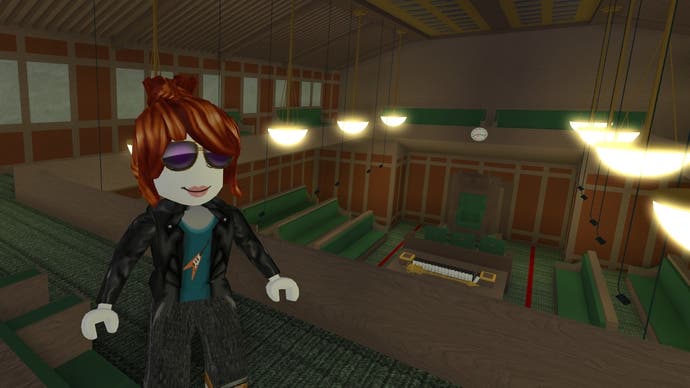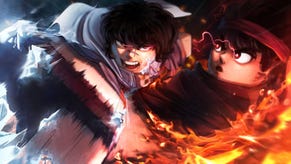I spectated prime minister's questions - in Roblox
Adventures in a political role-playing community.
"Mister Speaker, just last week the prime minister placed the Australian treasurer in His Majesty's Prison Service, with his only reasoning being that he 'served as a leading figure in a fake UK a while back'.
"...I would like to ask the prime minister what exactly his reason is for the imprisonment of the Australian treasurer?"
So begins one of the questions asked by the leader of the opposition in Parliament last month. No - not the real one that's currently embroiled in debates over Brexit.
I mean the one in Roblox.
If this name isn't ringing any bells, you're probably not alone, as Roblox remains relatively undiscussed in games media. While it may look like the outcome of an unfortunate accident at a Lego factory, Roblox is actually an incredibly successful game. Released in 2006, the free-to-play multiplayer title reached about 48 million monthly players in March 2017 - putting it in the same ballpark as Minecraft, which in February 2017 attracted 55m users per month. The current figure for Roblox stands at over 80m per month.
I compare Roblox to Minecraft for good reason: as a cross between sandbox and MMO with a young audience, there are plenty of similarities between the two. Roblox players are given the tools to design their own worlds and games which others can access via the game's website. According to Roblox, over 15 million games have been created thus far.
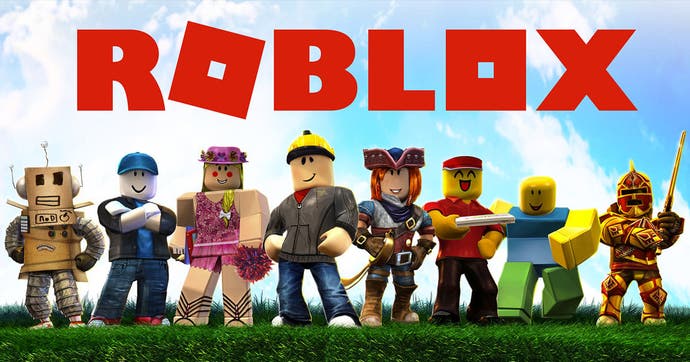
All of this makes it the perfect environment for role-playing. And, while the rest of the world is feeling pretty sick of global politics, Roblox players have created an extensive political role-playing community.
It's worth emphasising the remarkable scale of these groups. The largest, NUSA (the USA) boasts over 200k players, while the UK group I studied has a respectable 25k. Not all of these players are active in the community, but nonetheless, the figures are impressive - and the depth of the role-play even more so. Much of the role-playing runs parallel to the game on Twitter, with hundreds of Roblox accounts regularly posting news updates, detailed documents and images of in-game events. It's hilarious and impressive in equal measure.
Although this is a years-old role-playing community (which players told me began around 2012), the Roblox political world only received truly widespread attention last year, when several YouTubers discovered their network of Twitter accounts. I wanted to dive deeper by asking the role-players themselves about their activities and witness events in-game. Yes, including visiting the Roblox House of Commons.
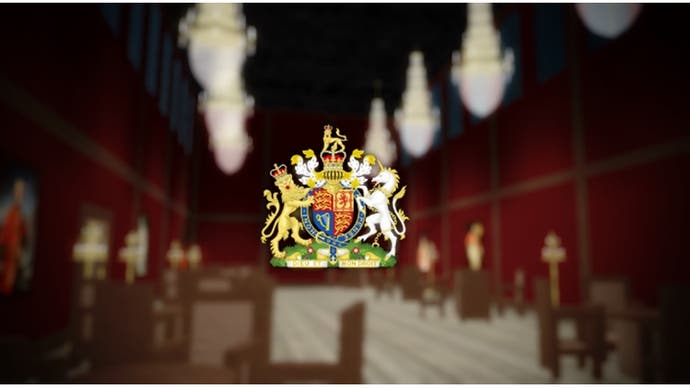
First, some basic rules about how it all works.
While the political role-playing communities mirror real-life political structures, according to role-player Sir. George M. Moore (leader of Roblox's Conservative Party), the mimicry ends at institutions. This means events like Brexit aren't currently being role-played, although Alistair Stirling (its minister for Colonial Affairs) says this is due in part to there being "no active EU existing on Roblox".
I was slightly disappointed at the lack of EU drama, but this does create space for some truly wacky political events. To name a few, there's currently a UK-US war, a UKIP-Labour coalition as the ruling party, and (seemingly) democratic elections in Russia. Maybe we're not living in the darkest timeline after all.
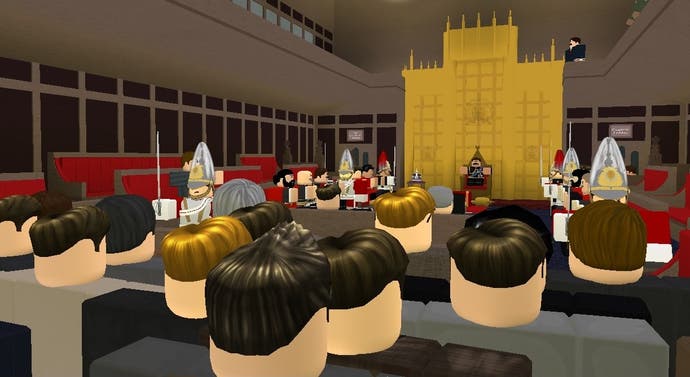
The institutions themselves, however, are copied in remarkable detail - from the big international organisations down to local bureaucracy. One of the biggest Roblox United Nations groups, which works as a form of legitimisation tool, is affiliated with nearly 150 different nations. The BritishSovereign UK group, meanwhile, has its own governmental departments - ranging from the Foreign Office all the way down to the Department for Business and Heritage. The British military alone has multiple branches, including a Royal Air Force, Royal Navy, British Armed Forces and even a Household Cavalry.
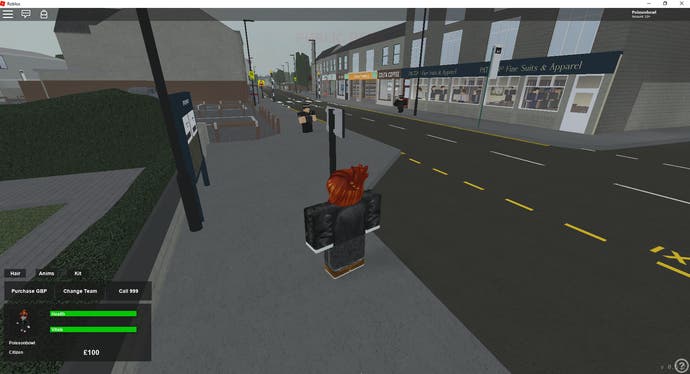
But the role-playing doesn't end at nation-states, as there are also NGOs like FIFA and the Olympics. The list of groups is endless.
Beyond replicating institutions, role-players go to great lengths to emulate the actual systems of government used in real-life: including legal procedures and the legislative process. The current US-UK war, which apparently began when the US violated the terms of a previous treaty by spying on the UK, nearly ended last month when the US President negotiated terms of surrender. But as in real life, treaties negotiated by the President must be approved by the Senate with a two thirds majority. Naturally, the Roblox Senate voted against it. Back to war we go.
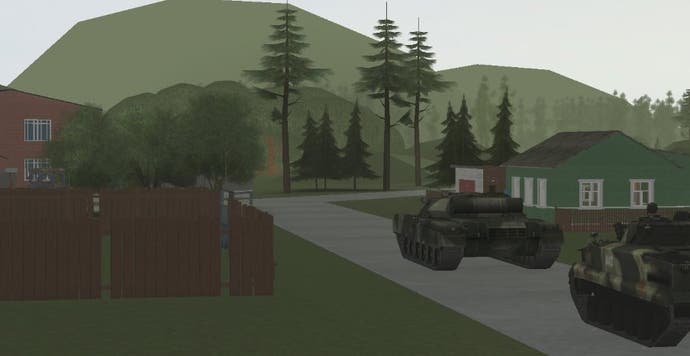
Where did I get all this from? Much of my Roblox current affairs knowledge comes from the role-playing community's media outlets, such as BBC News Roblox, RT News Roblox and ABC News Roblox. The outlets primarily post updates using Twitter, although ABC News Roblox has its own Wordpress where it publishes articles like this coverage of the recent Sydney riots. The site told me it has a small team of reporters to help with "daily news gathering", and has produced weekly round-up videos of current developments in Roblox politics. BBC News Roblox says it researches news stories primarily from the "Twitter accounts of political leaders" and "Discord chats where countries post their latest news".
What of the role-players themselves? How intense is this community? Having spoken to several involved, many swap jobs rather quickly as terms are rather short, while some hold several roles at once: meaning most have rather lengthy CVs. For example, here's Democratic Party chairman James Montagu's résumé.
James Montagu's absolutely ridiculous CV
- Governor General of Malta
- Governor General of Papua New Guinea
- Governor General of South Africa
- Prime Minister of New Zealand
- NZ MoFA and DPM x3
- NZ MP x5
- Canadian MoFA x1
- Canadian MoJ x1
- Canadian MoM x3
- Canadian MP x4
- British Empire Imperial Secretary
- Isle of Man Chief Electoral Officer
- Chief Whip of the UK Labour Party
- RCMP Assistant Commissioner
- RCMP Deputy Comm
- CEO Of BBC News International
- USA Senatorial Candidate's Head Campaign Manager
- Prince of Spain
- Director-General of the WTO
- UK DCMS Media Coordinator
- Deputy Secretary General of the Pacific Union
- Canadian Chairman of the Conservative Party
- France Group Administrator
- Cambodian MoFA
- Cambodian DPM
- Chief Justice of South Africa
- Chief Electoral Officer of South Africa
- Prince of Ethiopia
- RCMP PPS Inspector
- Former HLS AGENT NUSA
- Former Chairman of the British Labour Party
- Former nUSA HoR candidate
- Former eUSA Congressman
- Current Under Secretary of State nUSA
- Bureau of Prisons Prison Supervisor nUSA
- British Special Adviser for the Foreign Office
The amount of hours dedicated to this, however, seems to vary between role-players. Some appear to spend hours constructing this political world, while others, such as Stirling, say role-playing as an MP requires only a couple of hours per week. Regardless, it seems to require a fair amount of dedication to show up at PMQs every week, and role-players are held accountable for their levels of commitment.
But what if I wanted to become a Roblox politican, what would that take?
"In the UK, to be eligible to stand for Parliament you must comply with the relevant acts and electoral commission regulations," Roblox Conservative MP Sir George M. Moore told me. "[You must] either be selected as a candidate by a political party or register as an independent."
Blimey - that's some selection process. And unlike real life, you can't even collude with Russians to win the vote: the BritSov UK group has its own electoral commission, while James Montagu informed me the US has "electoral officers" and a version of the FEC called the "Congressional Electoral Commission". There may be countries in the real world with a less secure democratic process than this.
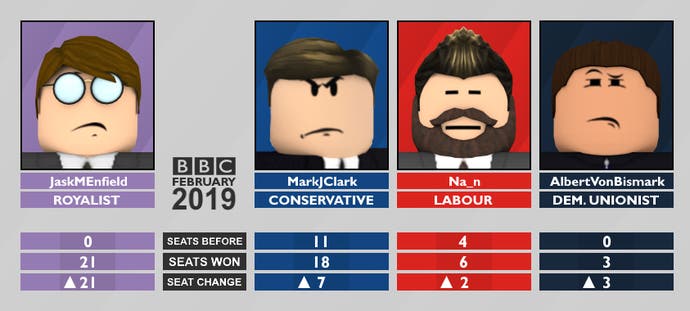
All this outside research was well and good - but I wanted to see some of the in-game politics for myself. Unfortunately I did not have the time nor experience to mount my own Roblox political campaign, but Sir George M. Moore suggested I should observe a session of PMQs to "see how the Commons operates".
He was right: and so, on a Friday evening when the rest of Eurogamer was down the pub, I booted up Roblox.
First, I created myself a Roblox avatar. I wanted to look the part of a reporter, but with only a limited selection of free clothing, the best I could do was a leather jacket and aviators. It was rough and ready, but it would do.
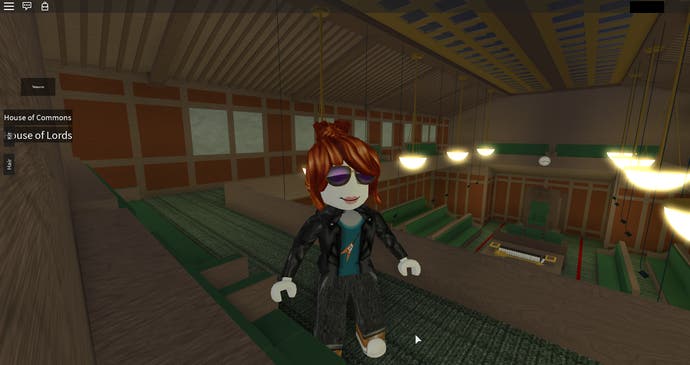
I eventually found my way to the spectator gallery and settled myself down on a bench. Somewhat conveniently I've actually spectated a real-life parliamentary session, and in comparison the Roblox version of the Commons is far more egalitarian. There's no glass panel dividing invited guests and the regular public, and you're free to have a good peek over the edge at the MPs below. Other than this, it's a fairly good copy - even if in Roblox's slightly hideous aesthetic.
Below me, the politicians started to gather. In the minutes before the debate began, an argument over someone's mother got rather heated. Players began to stand. The insults flew. A sword was drawn. Thankfully, like the real Commons, the distance between benches was at least the length of two drawn swords, and bloodshed was avoided.
Bemused as I was by the unfolding events, I was suddenly jolted upright by a deafeningly loud fanfair. The clock had struck 9pm, and it was time to kick off PMQs with a rousing rendition of God Save the King (there's currently a king in the Roblox world). Incredibly, every single MP jumped up unanimously to stand for the national anthem.
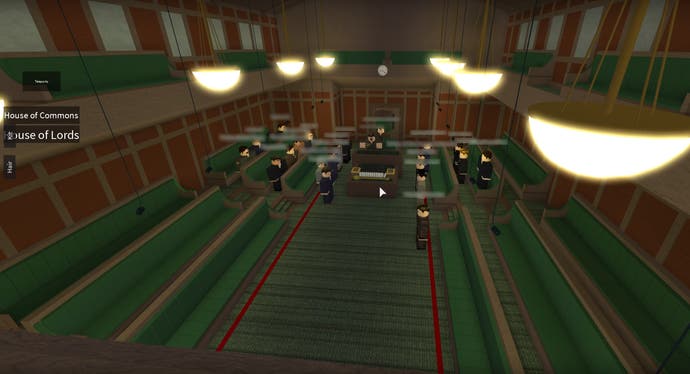
After the noisy start, the speaker of the house introduced the prime minister - Matthew Pawley (UKIP), and the leader of the opposition - MarkJClark (Conservative). The debate took place through Roblox's in-game text chat, with politicians typing responses at an impressive speed. Things kicked off quickly, with the leader of the opposition accusing the government of overseeing a "stagnating" Ministry of Justice - thanks in large part to the secretary of state for justice, who apparently hasn't been fulfilling his duties.
It sounded like the justice secretary had his head on the chopping blox. But the PM had something to say about that.
"I have seen the Justice Secretary organise many meetings over the past few weeks or so, and no one person from the Ministry even bothered to show up," the PM began. "This is a constant theme in the Ministry of Justice, where Ministry staff on the whole seem not to be interested in working with the government and the justice secretary.
"The justice secretary will be proposing a bill either tomorrow or next Saturday in our final legislative session of the term, and I am sure that he has plenty of tricks up his sleeve to try and enact some real change in the Ministry."
A bold claim - that the problems lay within the (supposedly impartial) civil service and not the government. The leader of the opposition countered, seemingly suggesting the department's disorganisation could be solved by communications outside of the game.
"Mister speaker, I must say and remind the PM that in-game meetings do not solve the issues evolving in the Ministry of Justice," the leader of the opposition stated. "Rather than shifting the fault, they should acknowledge the fault, mister speaker.
"Working to implement real changes to the ministry a week before parliamentary dissolution will not do the trick."
A thorny issue indeed - one that was never quite resolved, as the topic swiftly moved onto further devolution for Northern Ireland.
In the midst of all the excitement, I suddenly noticed I was no longer alone in the gallery. On the far side was a small gathering of army generals, who were bickering about attendance numbers at the latest inspection, and began slapping each other around. Seems like the British army could do with some better discipline.
Meanwhile, back in the chamber, the leader of the opposition asked that question from the start. Why had the Prime Minister imprisoned the Australian treasurer?
The question was raised. The room tensed. A general fell from the gallery and exploded in a shower of giblets.
"In regards to the imprisonment of the gentleman the Rt Hn gentleman refers to, I often in my free time sort out immigration, and when I do so I check all pending immigrant groups, at the time of the gentleman referenced being incarcerated, he was a member of a false United Kingdom group and a senior one at that."
It's treason then.
"The gentleman in question has approximately 10 times joined since, and every time I have remembered his name and placed him back in prison," the PM continued. "This is not remotely to do with the Australian government whatsoever, simply a member of a fake UK group attempting to become a citizen. I see no issue with the gentleman's imprisonment and believe it to be just."
And that was that. Questions concluded, the session was adjourned - and all the MPs flew away in a shower of colourful sparkles.
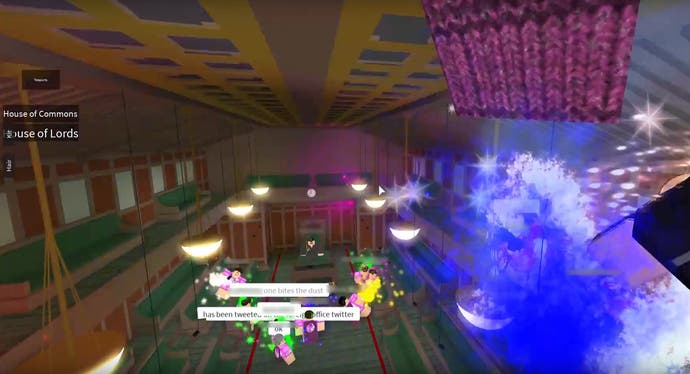
Overall, I was seriously impressed by the Roblox political world. The role-playing is incredibly detailed, amusing, and strangely imaginative - despite the subject matter seeming rather dull.
Something that did cause concern, however, was the weird reverence for the British empire. The Foreign Office, for instance, also deals with "colonial" affairs - while in the Commons players frequently referred to the Australians as "colonial brethren". Not that it lasted.
While the imperialism makes me a little uneasy, the focus on empire seems to be detached from actual history, with Roblox politics occuring on a weird alternative history timeline. Nations can join and leave the empire at will, although Britain is still the head.
Similar to most 4X strategy games, much of the actual conflict in Roblox politics centres around wars and empires simply because it's - well, more exciting than debating tax rates. This may explain why empires are so common in the role-playing world. Plus, many of these players are under 18, so I'm willing to cut them some slack.
Despite the emphasis on militarism, it seems Roblox is also able to get players interested in democratic political systems. My own political education in secondary school involved creating a website about bills: an activity so boring my classmates vowed never to take an interest in politics again. Roblox players, meanwhile, are actively seeking to understand and emulate the complicated systems - albeit in their own unique ways.
"I find it enjoyable to take on positions of leadership within sections of the game and I've developed a love for politics from the game," Stirling told me. "The opportunity to role-play as a politician allows me to express both my passions for leading and politics."
And, as Montagu emphasised, it's also an opportunity to make friends with a mutual interest in politics - even if you disagree with their ideas. "The community is huge and quite fun to engage with," he explained. "You meet different people that are caring and fun to be role-playing with."
I guess this is something Roblox can boast to have over our real-world politics, which has reached all-new levels of polarisation and antagonism. When Brexit hits in March, I might just stick my head back into Roblox for a time. Sweet relief.
